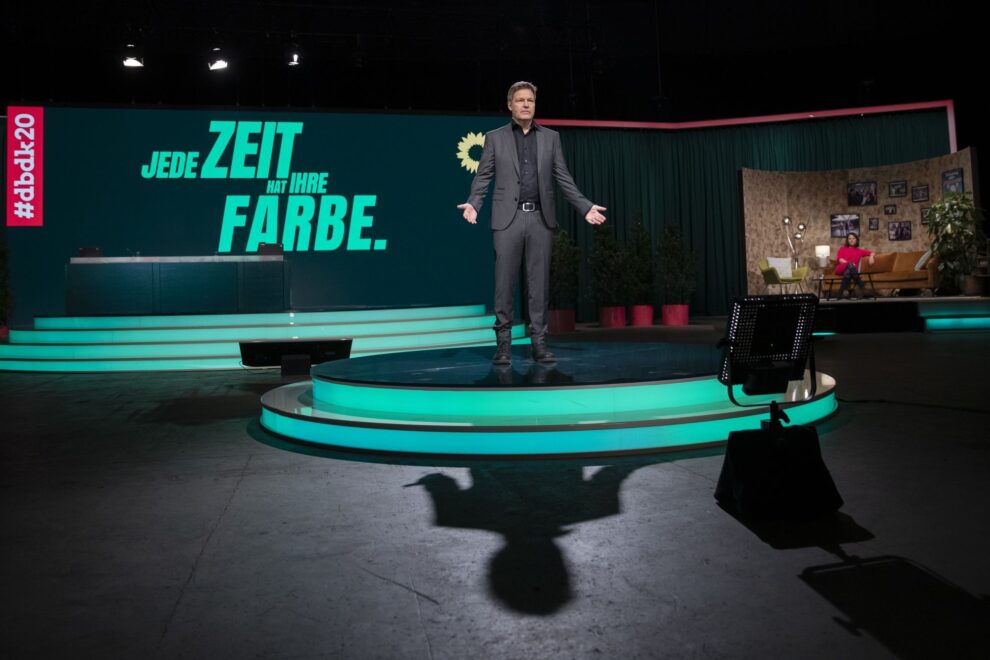
(Bloomberg) — Germany’s Green party opened its bid to run Europe’s biggest economy with a manifesto that seeks to broaden its appeal among mainstream voters, while risking opposition from fiscal hawks and business leaders.
Underpinned by a 500 billion-euro ($593 billion) green spending plan, delegates at a virtual party convention backed their leaders over the weekend in staking out a claim to succeed Chancellor Angela Merkel after next year’s election. Goals in the manifest approved on Sunday include speeding up Germany’s transition to a carbon-free nation, embedding it deeper in the European Union and expanding social services.
“For the first time, a third party will fight in earnest for the leadership of this country,” said Green co-chairman Robert Habeck, 51, referring to the Social Democrats and Christian Democrats who have dominated German politics since World War II. “It’s a tall aspiration; a bold one, perhaps cheeky.”
The Greens have gained the most members among German parties in recent years and briefly surpassed Merkel’s Christian Democratic Union in the polls little more than a year ago in the wake of big climate protests. This year, the Covid-19 pandemic is exposing the party’s shortcomings: many Germans still view it as an inexperienced, niche party that they wouldn’t trust to handle an economic crisis. Merkel has said she won’t run for a fifth term next year.
Support for Merkel’s CDU-led party bloc was 36% in the latest weekly Forsa poll, with the the Greens at 18% and Merkel’s Social Democratic coalition partner at 17%. The same poll showed that the Greens, Social Democrats and anti-capitalist Left party wouldn’t have enough support to form a majority government if elections were held now.
Habeck, who polls suggest is the most popular Green leader nationwide, pointed to the party’s achievements in state governments since their last spell in national power under former Chancellor Gerhard Schroeder..
“With mild optimism, we’re working on solutions,” Habeck told delegates. “And for those solutions, we’ll fight to get to power.”
Piggy-backing on discontent about inadequate child care and ill-equipped schools,
Annalena Baerbock, who shares the party leadership with Habeck, called for a doubling of government spending on primary education. She also called for Germany and Europe to do more to ensure their sovereignty on health, climate and security in the face of U.S. and Chinese interests.
“As the largest single market in the world, we don’t need to choose between a capitalist digital system or an authoritarian,” Baerbock, 39, said from a three-stage studio in Berlin that hosted the digital conference.
Spending Plans
Many of the Greens’ ideas come with a hefty price tag. The party proposes investments of 500 billion euros ($593 billion) over a decade to help finance the transition to a more sustainable economy. That would require easing constitutional rules that limit public debt.
“Just like the Covid pandemic, the climate crisis represents an existential threat,” Sven-Christian Kindler, the party’s budget spokesman, told Bloomberg News. “That requires acting fast and big sums of money.”
The party’s proposal to move forward the ban on coal-fired power generation from 2038 would increase energy costs that are already among the world’s highest and weigh on German industry’s competitiveness, business leaders say.
All that would make any negotiations with the CDU to form a coalition government more difficult.
The gap on taxes and finance was on display last week when Friedrich Merz, perhaps the most likely candidate to lead the CDU, blasted Baerbock’s proposed investment plan as an irresponsible debt accumulation that would burden future generations.
The CDU is expected to elect a new leader in January, followed later by a decision among the CDU and its Bavarian affiliate, the Christian Social Union, on a candidate for chancellor.
(Updates with final approval in second paragraph)
For more articles like this, please visit us at bloomberg.com
Subscribe now to stay ahead with the most trusted business news source.
©2020 Bloomberg L.P.












